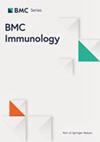Evaluation of immunophenotypic alterations of peripheral blood lymphocytes and their sub-sets in uncomplicated P. Falciparum infection
IF 2.9
4区 医学
Q3 IMMUNOLOGY
引用次数: 0
Abstract
Malaria is a life-threatening parasitic disease typically transmitted through the bite of an infected Anopheles mosquito. There is ample evidence showing the potential of malaria infection to affect the counts of lymphocyte subpopulations in the peripheral blood, but the extent of alteration might not be consistent in all geographical locations, due to several local factors. Although Ghana is among the malaria-endemic countries, there is currently no available data on the level of alterations that occur in the counts of lymphocyte subpopulations during P. falciparum malaria infection among adults. The study was to determine the immunophenotypic alterations in the level of peripheral blood lymphocytes and their subsets in adults with uncomplicated P. falciparum malaria infection and apparently healthy participants. The study was a cross-sectional comparative study conducted in two municipalities of the Volta region of Ghana. Blood samples were collected from study participants and taken through serology (P. falciparum/Pan Rapid Diagnostic Kits), microscopy (Thick and thin blood films) and Haematological (Flow cytometric and Full blood count) analysis. A total of 414 participants, comprising 214 patients with malaria and 200 apparently healthy individuals (controls) were recruited into this study. Parasite density of the malaria patients ranged from 75/µL to 84,364/µL, with a mean of 3,520/µL. It was also observed that the total lymphocytes slightly decreased in the P. falciparum-infected individuals (Mean ± SD: 2.08 ± 4.93 × 109/L) compared to the control group (Mean ± SD: 2.47 ± 0.80 × 109/L). Again, there was a significant moderate positive correlation between parasite density and haematocrit levels (r = 0.321, p < 0.001). Apart from CD45 + T-cells, more people in the control group had normal values for the lymphocyte subsets measured compared to the malaria patients. From the results obtained, there was high parasite density among the malaria patients suggestive of high intensity of infection in the case group. The malaria patients again showed considerable haematological alterations in lymphocyte sub-sets and the parasite density appeared to be strongly associated with CD4 + T-cell reduction. Also, the parasite density significantly associated with decreasing haematocrit levels. This indicates that lymphocyte subset enumeration can be used to effectively support malaria diagnosis.评估无并发症疟原虫感染时外周血淋巴细胞及其亚群的免疫表型变化
疟疾是一种威胁生命的寄生虫病,通常通过受感染的疟蚊叮咬传播。有大量证据表明,疟疾感染可能会影响外周血中淋巴细胞亚群的数量,但由于一些当地因素的影响,其改变程度可能并非在所有地区都一致。虽然加纳是疟疾流行国家之一,但目前还没有关于成人感染恶性疟原虫疟疾期间淋巴细胞亚群数量变化程度的数据。这项研究旨在确定无并发症恶性疟原虫疟疾感染成人和表面健康的参与者外周血淋巴细胞及其亚群水平的免疫表型变化。该研究是一项横断面比较研究,在加纳沃尔特地区的两个城市进行。研究收集了参与者的血样,并通过血清学(恶性疟原虫/潘氏快速诊断试剂盒)、显微镜(厚和薄血膜)和血液学(流式细胞计数和全血细胞计数)分析进行检测。这项研究共招募了 414 名参与者,其中包括 214 名疟疾患者和 200 名表面健康者(对照组)。疟疾患者的寄生虫密度从 75 个/微升到 84 364 个/微升不等,平均为 3 520 个/微升。研究还发现,与对照组(平均值±标准差:2.47±0.80×109/L)相比,恶性疟原虫感染者的总淋巴细胞略有下降(平均值±标准差:2.08±4.93×109/L)。同样,寄生虫密度与血细胞比容水平之间存在明显的中度正相关(r = 0.321,p < 0.001)。除 CD45 + T 细胞外,与疟疾患者相比,对照组中有更多人的淋巴细胞亚群值正常。从结果来看,疟疾患者的寄生虫密度很高,表明病例组的感染强度很高。疟疾患者的淋巴细胞亚群再次出现显著的血液学变化,寄生虫密度似乎与 CD4 + T 细胞减少密切相关。此外,寄生虫密度与血细胞比容水平下降也有很大关系。这表明淋巴细胞亚群计数可用于有效支持疟疾诊断。
本文章由计算机程序翻译,如有差异,请以英文原文为准。
求助全文
约1分钟内获得全文
求助全文
来源期刊

BMC Immunology
医学-免疫学
CiteScore
5.50
自引率
0.00%
发文量
54
审稿时长
1 months
期刊介绍:
BMC Immunology is an open access journal publishing original peer-reviewed research articles in molecular, cellular, tissue-level, organismal, functional, and developmental aspects of the immune system as well as clinical studies and animal models of human diseases.
 求助内容:
求助内容: 应助结果提醒方式:
应助结果提醒方式:


